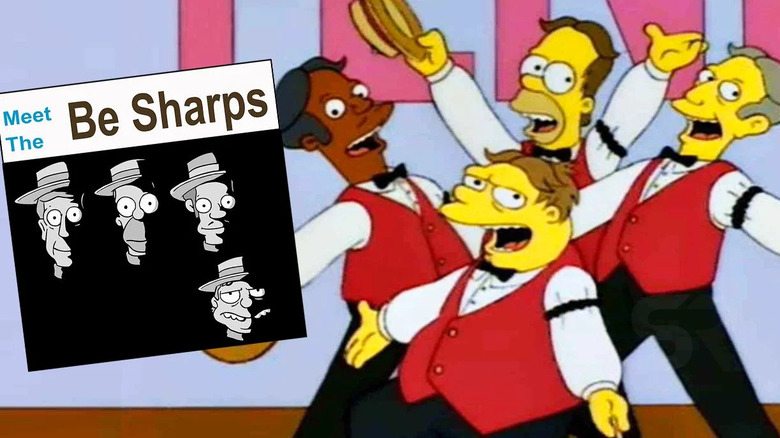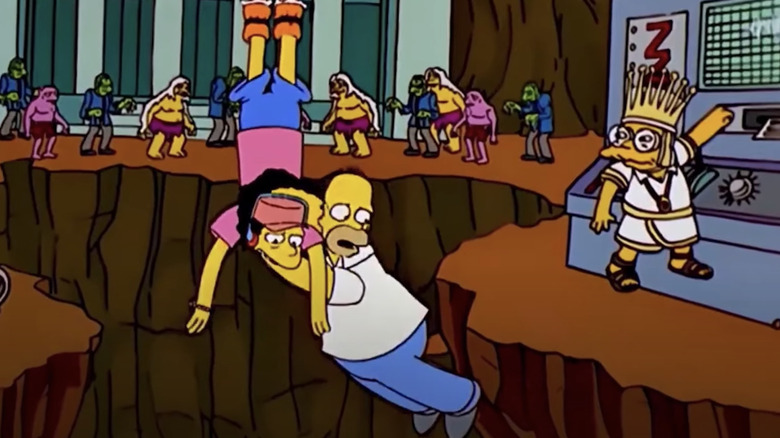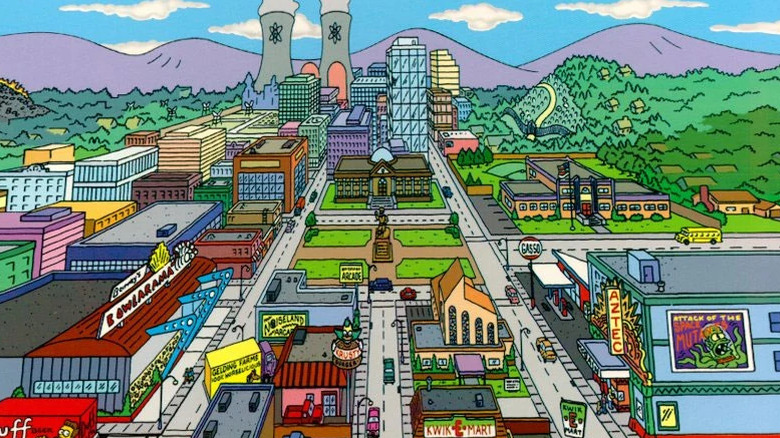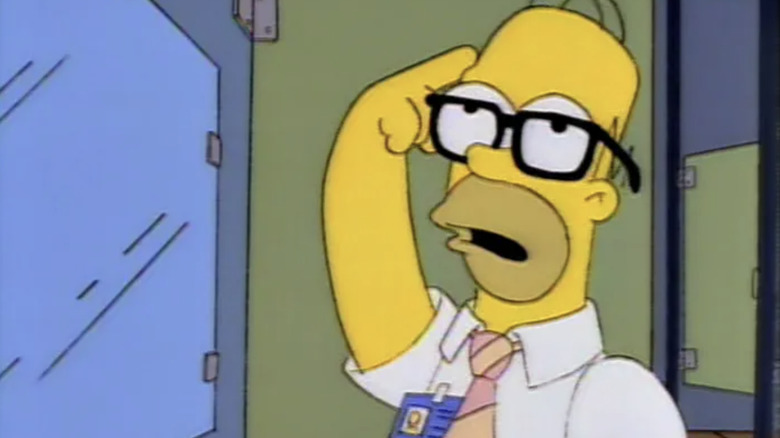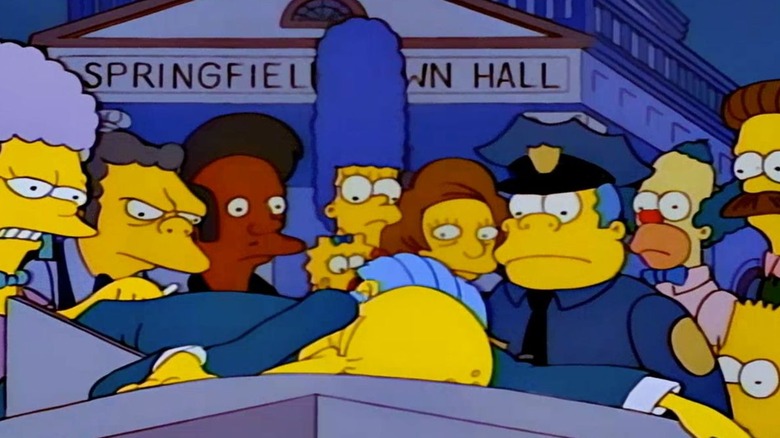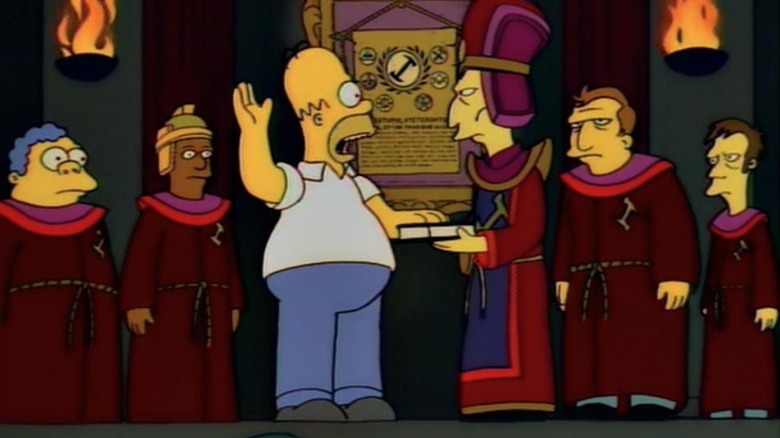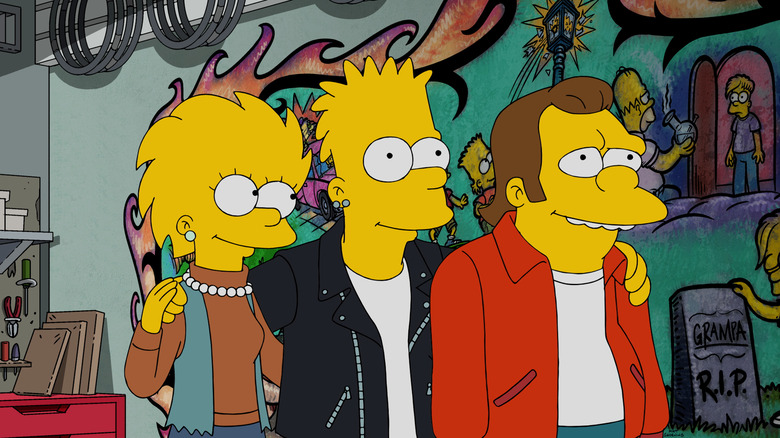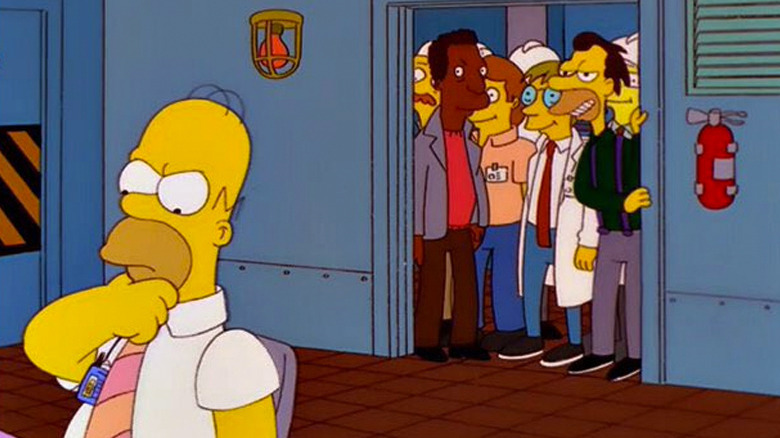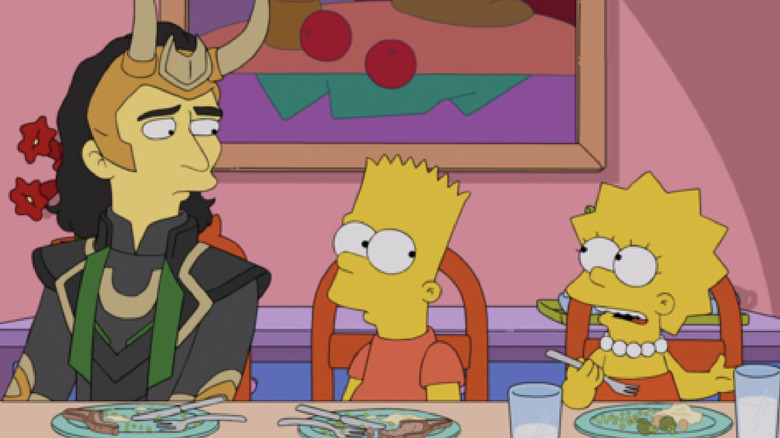Theories About The Simpsons That Change Everything
"The Simpsons" has endured many eras of internet culture — in fact, it debuted in 1989, largely credited as the year the world wide web was invented. Decades later, memes like "Steamed Hams" have taken on a life of their own, and many of the show's gags have been breathlessly repurposed as Nostradamus-like predictions made real. Over the 30-plus years since the show's debut, Springfield's favorite family has been evasive, illogical and often nonsensical — in short, behaving like cartoon characters — leaving fans to do some legwork.
Naturally, this has given birth to more fan theories than there are burning tires in the Springfield Tire yard. Also naturally, many of these theories are every bit as entertaining as the "Simpsons" episodes which inspire them.
Attempting to build continuity from "The Simpsons" — a show in which no one ever ages and every episode resets at the end — can require theories so convoluted that they are borderline conspiracies. But they are nonetheless fun to discuss — so, put on your tinfoil hat and buckle up, because here are 12 of the best "Simpsons" fan theories that might just change everything you think you know about the classic cartoon series.
Homer is still in a coma
One of the earliest "Simpsons" fan theories even predates Reddit. On April Fools' Day 1993, fans got the classic episode "So It's Come to This: A Simpsons Clip Show" (Season 4, Episode 18), which concluded with Homer waking up from a seven-week coma. As the family laughed it all off and the episode concluded, life in Springfield reset again for the next episode.
But what if it didn't? That creepy question has led some fans down a deep, all-consuming rabbit hole.
Since the episode aired, theories have proliferated that everything to happen since has been a product of Homer's imagination, experienced as he continues to lie in a hospital bed in a vegetative coma state. As evidence, they point to the fact that plotlines of "The Simpsons" tended to be more mundane (Bart cheats on a test, Lisa gets a crush on a teacher) before "Clip Show" than the preposterous ones following it (Homer goes to outer space, Mr. Burns captures the Loch Ness Monster). They also point to the never-changing ages of his children, constantly re-setting year after year (it is assumed Homer hears information about the existence of, say, Lady Gaga, which is why he imagines 2010s celebrities interacting with his same-aged kids from 1993), and the fact that in "Homer the Heretic" (Season 4, Episode 3) God told Homer he'd die in six months — the exact timeframe that episode pre-dated "Clip Show."
In 2015, series producer Al Jean spoke with TMZ and shot down the theory. "That would mean back in 1993 we would presume the show was going on for years and years more," said Jean, who along with Mike Weiss left "The Simpsons" in 1994; Jean would later return. "And right before we left, threw this hidden monkey wrench in for all our successors."
Homer is still collecting royalties from the Be Sharps
The Season 5 premiere, "Homer's Barbershop Quartet," planted a seed for a theory that explains how Homer can live such a good life despite having a low wage, menial job. The episode recalled the rise and fall of the Be Sharps, a barbershop quartet consisting of Homer, Apu, Barney, and Principal Skinner. In the classic episode, we see that their short-lived fame reached Beatles-like heights, and some fans think this is how Homer could afford to drive Frank Grimes crazy years later with his "palace," two cars and lobsters for dinner.
This reddit theory says Homer and his friends are still collecting substantial royalties from those Be Sharps records — a steady source of income that supplements his job at the plant. As for the other members of the band? It's well-known that Barney is drinking his life away via a bar tab that needs NASA calculations to maintain accuracy; Apu drove a Pontiac Firebird and had a nice house in the suburbs until he fathered eight children and had to cut back; Skinner possibly paid for that nice house he lives in with his mother (and presumably had to rebuild after the Steamed Hams incident burned it down), and Seymour has also possibly allowed her to make poor investment choices with his money, like Fleet-a-Pita.
Don't agree with that theory? Another fan notion postulates that Homer's extra income is derived from owning the Denver Broncos — which Hank Scorpio gifted him in Season 8's second episode, "You Only Move Twice."
Hans Moleman is multiple mole men
Hans Moleman, everyone's favorite elderly sad sack, always seems to be nearby whenever a "Simpsons" joke needs a physical comedy payoff — or somebody to die. Entire articles have been written about this supremely unlucky, mysterious Springfield resident who has perished multiple times and stated his age as being both 88 and 31 years old.
While producer Al Jean likes to leave some things a mystery, when it comes to Moleman, he seemingly enjoys speculating alongside the fans. "It is possible that he's king of this underground realm," Jean said in a 2019 interview with Vulture, admitting the character is based somewhat on underground ruler "Mole Man" from the "Fantastic Four" comics (indeed, he can be briefly glimpsed ruling an underground lair in Season 11, Episode 6's "Hello Gutter, Hello Fadder"). "He's been blessedly free of any change or growth, any learning or any knowledge; he's the same lovable loser stuck in a line."
Of course, the multiple mortal accidents of Hans Moleman (who has died as many as 46 times) have given rise to their own Reddit theory: Every time we see him, it's a different Moleman.
This supposition imagines Moleman as a lemming, falling to his death only to be replaced by another moments later; there is supposedly a near-endless supply living beneath the streets of Springfield. Much of this theory is built upon Jean's allowance that there could be a community of Moleman minions, as well as an unaired subplot from the classic episode "22 Short Films About Springfield" that depicted Moleman as an adventurer with an evil twin who kills him — only to have God return him to Springfield. Further evidence that there is more than one Hans includes is revealed in "Sweet and Sour Marge" (Season 13, Episode 8) and "Ned 'n' Edna's Blend" (Season 23, Episode 21) where you can see two of him in the same shot. Seriously, when was the last time you spotted two Milhouses? Double Disco Stus? Clearly, this must be intentional.
Whatever Hans Moleman is (and however many there are of him), his Kenny-like knack for returning from the dead seems to be a theory that could have some truth to it — in refusing to shoot it down, the supposition has seemingly been acknowledged by the "Simpsons" gatekeepers as a potential reality.
The Simpsons live in Springfield, Maine
For decades, the "Simpsons" writers have played a sort of "Whack-A-Mole" game with fans. Every time viewers think they have a lead on which state the show's Springfield is located in (33 out of 50 states has one, so there are plenty of candidates), another clue jokingly contradicts it.
One "Simpsons" theory has been engineered by a fan who is certain they've figured it out. It's a bit dated now, but using evidence presented throughout the show's first 15 or so seasons, it concludes that the only viable option for the home of the Simpsons is in Maine.
The theorist (who goes by screen name JurassicParkerr in the original post) uses the process of elimination while examining various clues, joking "I wish I put this much effort into school."
Examining details in several episodes where the family clearly travels to other states, the fan posits that if the family is traveling to, say, Florida then they can't be living there. Another of the biggest hints in the series comes in the Season 7 episode "Two Bad Neighbors," where George Bush Sr. moves to Springfield. There is a throwaway joke at the end about Bush's residency, which narrows down the list to just a handful of states if you examine the states the former president lived in up until that time.
While it is hard to say whether the Springfield depicted in the show feels like a city that would be in Maine, the theory uses a process of elimination to prove that one of the longest running jokes in the show's history might indeed have an answer.
The Simpsons are geniuses but stifle their talents
It's common knowledge that Lisa Simpson is the genius of the family, while Homer and Bart are true Simpsons, living out lives of insufferable idiocy and tendencies towards selfishness and occasional violence. But what if this simply wasn't true? What if, instead, every member of the Simpson family was secretly a genius?
That's the theory a Reddit user posited in 2012, along with some pretty compelling evidence. They first pointed to "HOMR" (Season 12, Episode 9), in which the Simpson pater familias discovers a crayon lodged in his brain during childhood that has hindered his intelligence. After a brief period of removal that plays out like a riff on Daniel Keyes' "Flowers for Algernon," genius Homer ultimately decides to return to a life of ignorant stupidity.
There is also "Lisa the Simpson" (Season 9, Episode 17), where it is revealed that all female Simpsons are smart, while the men get the so-called "Simpson gene." However, many flashbacks throughout other episodes have depicted grandpa Abe Simpson showing off great skill as a fighter pilot or pianist, lending further credence to the notion that each family member is indeed smart, but suppressing their intelligence willfully or through a lack of expression.
According to this theory, the non-Lisa Simpsons ultimately choose to live a continued life of ignorance because, well, ignorance is bliss. For proof, the theorist points to Lisa — by far the most intelligent of the family, but perhaps also the most miserable.
Marge shot Mr. Burns
In its time, "Who Shot Mr. Burns" was a phenomenon, leaving a cliffhanger between Seasons 5 and 6, and the whole world wondering who the heck did it. In a twist that defied Vegas odds, it is now widely known that Maggie was the shooter in an unfortunate (yet utterly hilarious) accident that involved Mr. Burns literally stealing candy from a baby. But that explanation simply isn't just enough for some fans, who insist there is a deeper, darker conclusion hidden in plain sight.
According to a Reddit theory posted in 2013, Marge was the character who shot Burns, hating the town's wealthiest man for ruining her family's life (both in the first episode of the two-parter and in previous encounters), and so she planned the perfect crime to exact revenge. And the person who helped get her off the hook as a suspect was ... Mr. Burns?
"Burns did in fact write [M S] on the sun dial at the time but while in the hospital, he thought about it and since Marge was very dear to him, he decided to blame it on the baby which of course he knew that there wouldn't be any harm to the baby," writes the original poster, pointing to Season 4, Episode 7 "Marge Gets a Job," where it was revealed that Mr. Burns had a thing for Marge. "Justified by Wiggum's sentence, no jury in the world is going to convict a baby."
The theory adds a layer of Hitchcockian complexity to this murder mystery, and further evidence seems to present itself if you keep pulling at the thread. For instance, when Burns was first discovered after the shooting, it was Marge who accused Smithers of the deed. Then there's the bottom line: A grown woman pulling a gun's trigger is a far more logical explanation than a pacifier-sucking baby.
Bart was a Stonecutter long before Homer
Looking back on the golden age of "The Simpsons," one of the all-time classics has to be considered "Homer the Great," the Season 6 episode where Homer stumbles on to Springfield's oldest secret society, the Stonecutters. In the episode, fans learn that many members of the Springfield elite are members of this society that secretly run the city. According to one theory, what Homer did not discover, however, is that his son had been a Stonecutter for years.
When Homer entered the cult, fans learned that Mr. Burns was among its powerful members. The theory employs that information while pointing to the Season 2 finale "Blood Feud," when Bart gave blood to save the life of Homer's irascible boss. As established in "Homer the Great," there are only two ways of becoming a Stonecutter: Being born into it, or saving the life of another Stonecutter. By that rationale, Bart may have been invited to join the powerful society way before Homer even learned about its existence.
Clues throughout the episode retrospectively lend this theory some credence; one line in particular seems to spill the beans. Early in "Homer the Great," after noticing a change in Lenny and Carl, Homer says he feels like there's a conspiracy. Bart winks and replies: "Yeah, a conspiracy. Do you think maybe Lenny and Carl were involved in the Kennedy assassination?" In the world of "The Simpsons," if there was a conspiracy to kill JFK, you can bet the Stonecutters would be behind it — and Bart would know the truth.
"The Simpsons" will end with Bart creating "The Simpsons"
Another theory that asserts Bart's sly intelligence is this 2015 one that could actually turn out true — that is, if "The Simpsons' ever goes off the air. It claims that the show will conclude with a startling reveal: Bart created "The Simpsons" universe, and is telling his life story in the form of the show.
When Matt Groening first created "The Simpsons," he fully intended Bart to be the main character. In fact, Groening saw the character as something of a stand-in for himself, and named the other family members after his own family.
As we now know, after Bart initially became the breakout character of the series (Do the Bartman, anyone?), "The Simpsons" shifted its focus over to Homer. In the decades since, while Bart has always received plenty of screentime, Homer has arguably become the more dominant protagonist. A few episodes barely feature any of the Simpsons, in fact, instead focusing on various residents of Springfield. This is all supposedly because Bart is the storyteller.
"In every flash forward to the future, Bart is portrayed as something of a loser," wrote the original post creator. "I believe that this isn't the end for Bart. I believe that Bart Simpson, the half-EGOT winning writer and animator, is destined to mirror his real-life counterpart and create the record shattering sitcom based on his adventures with his family."
If true, this theory could change everything, because we've witnessed more than 600 episodes of material through the eyes of a 10-year-old boy. Perhaps Homer isn't really an abusive father, but the choking scenes are Bart projecting. Maybe Lisa isn't actually a sad sack, but is presented as such through the prism of Bart's jealousy. There's only one way to find out — keep watching "The Simpsons" until your great-grandkids someday show you the final episode in your retirement home.
Homer Knows He's A Cartoon
A theory that Homer is self-aware and knows he is a cartoon can be traced all the way back to the Season 4 episode "Homer the Heretic," when he sees God in his dreams.
In the final scene of that episode, Homer falls asleep in church and has a vision of God revealing the meaning of life — but before he says anything of substance, the end credits cut him off. Decades later, fans are still theorizing about what God was about to tell Homer. One popular theory? Homer had his true identity revealed to him in that dream, as God explained he was a fictional character in a cartoon show.
"Homer, in this moment, learns that there are almost never lasting consequences for his actions," postulates the Reddit poster. "He can quit his job, go to space, ignore his kids and wife, whatever he wants. He's in a status quo forever. This explains why Homer has become a bit crueler in the later years of the show. He's lost some empathy and knows he's basically untouchable."
This theory is a useful explanation for the increasingly ridiculous premises and adventures that have ensued since Season 4. As Homer began to understand that the world held no consequences for him, his antics inevitably became more outlandish, similar to Bill Murray's character in "Groundhog Day."
The Tesseract theory
If you love "The Simpsons" and the MCU, get ready for the pop-culture equivalent of mixing your peanut butter with someone else's chocolate. It's time to examine the almighty tesseract theory.
Traced back to a forum post from 2007, the theory claims that Springfield is trapped inside a tesseract that warps time and space, similar to the crystalline, cube-shaped containment vessel that held the Space Stone in the Marvel movies. Whether the Space Stone is influencing the odd events in the "Simpsons" universe could probably occupy dozens of hours of heated debate between Comic-Con conference rooms, but this much is clear: something strange is going on in Springfield.
The tesseract theory essentially explains everything that doesn't make any logical sense in "The Simpsons," in one fell swoop.
"The town's internal geography is in a constant state of flux," the theory posits. "The city is also stuck in a lime loop, with no one ever aging and children repeating the same grade forever despite having graduated multiple times ... death is still permanent, except on Halloween."
In a more recent development, the now-Disney-owned series released "The Good, the Bart, and the Loki," a 2021 Disney+ short film that firmly established noted Tesseract-enthusiast and God of Mischief Loki as being a part of "The Simpsons" continuity. In the short, Loki befriends the Simpsons and seems determined to stay in town, cooing: "Finally, a functional family."
So, could Loki be using the MCU tesseract and some time-traveling chicanery to manipulate Springfield to his whims? If the Disney+ "Loki" show reminded us all of anything, it's that he can pop up anywhere and at anytime — and that he has a tendency to bend timelines when it behooves him. So, let the theorizing begin anew.
The show is actually from Flanders' POV
Another fun theory to speculate on is whether the entire show is told from the point of view of Ned Flanders. The family's devout, left-handed neighbor is often terrorized by the Simpsons, which has led fans to believe he is drowning in resentment — and since we're supposedly seeing things through his eyes, this is why they are depicted as being so dumb, lazy and dysfunctional.
The theory posits that the Simpson clan is actually quite normal, successful and happy, and Ned resents them for this success. In various episodes, we have witnessed Flanders' crises of faith, as he acknowledges he is not a perfect Christian and has doubts about his beliefs. So, despite his best efforts to live a noble life, perhaps he can't help but let jealousy make him see Homer as a dolt, Bart as a menace, and Marge as the nagging wife.
There is, however, one substantial piece of evidence that undermines the hypothesis. In "No Loan Again, Naturally" (Season 20, Episode 12), fans watched as Marge and Homer lost their house — and Ned purchased the homestead, only to rent it back to the Simpsons. After some hijinks involving Ned serving as Homer's landlord and de facto fix-it man resulted in threats to kick them out, Flanders ultimately made the noble decision to welcome the Simpsons back to their home and allow them to continue to living there indefinitely.
So, despite all the horrible ways they might treat him and his family, Flanders must still ultimately like the Simpsons. After all, he does choose to keep allowing them to live next door, when all it would take to get them out of his life was an eviction slip and a few weeks' notice. Such kindness doesn't exactly sound like the sort of character whose blind rage would spend decades painting the Simpsons with such a contemptible brush.
Mr. Burns is fully aware of Homer and his incompetence
One of the best recurring gags on "The Simpsons" is that Mr. Burns doesn't know who Homer is, even after decades of plotlines involving each other. Exchanges between Burns and Smithers often begin with the subordinate needing to explain who "that employee in Sector 7G" is, and Burns replying "Simpson, eh?" as if he's never heard the name. This lack of recognition was one of the supposed motivators behind Homer being a suspect in the shooting of Mr. Burns.
But what if this unreasonable level of forgetfulness (especially after being in so many unforgettable situations together) is not just a recurring gag but a clever tactic by Burns to keep his factory running on the cheap? One 2019 Reddit theory thinks Burns is being dumb ... like a fox.
"Mr. Burns clearly remembers the effect Homer has had on his life, as he always remembers other Simpson family members — not only by name but their role in his life. I believe he only pretends to not recognize Homer, both directly and indirectly, so that Homer will never progress and realize his dreams," says the post. "When Homer is absent, Burns keeps up the charade in order divert any attention away from Homer — to make him seem more useless and unsuccessful than he already is."
Of course, any "Simpsons" viewer would agree that Mr. Burns loves to cut corners, even at the expense of lives and nuclear power disasters. So, it checks out that he wouldn't want a safety inspector who is competent, or else his entire operation could be shut down. In order to keep things running at as low a cost as possible, could Mr. Burns keep Homer on the payroll — then pretend he doesn't know who he is, just to avoid liability? As with the other theories above, it's a fun new lens to consider — and one that gives you an excuse to go back and watch some classic "Simpsons" episodes all over again.


